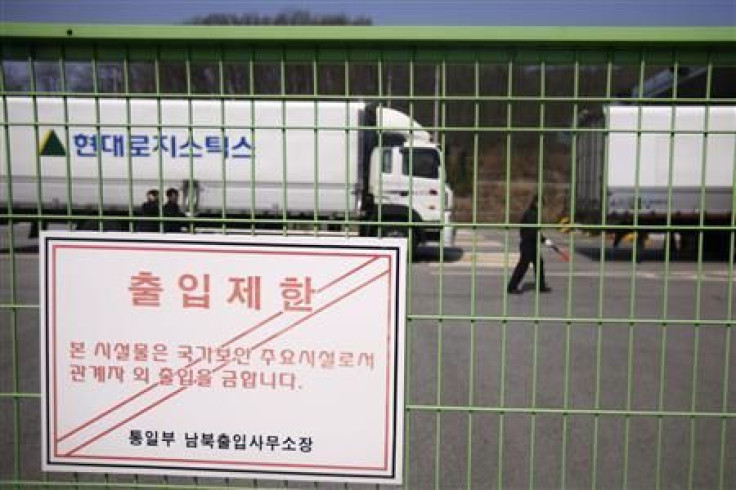As North Korea Bans Entry To Joint Industrial Complex With South, Chinese Support Wanes [VIDEO]

North Korea barred South Korean workers from entering the inter-Korean industrial park on the border at Kaesong Wednesday morning. This latest escalation by North Korea stokes new fears the reclusive nation may be moving towards war.
According to South Korean news agency Yonhap, North Korea threatened to close the Kaesong Industrial Complex a few days ago.
Seoul’s Ministry of Unification, the government body that deals with relations with North Korea, received a notification of the new restrictions from the North earlier in the day.
“South Korea’s government deeply regrets the entry ban and urges it to be lifted immediately,” ministry spokesman Kim Hyung-suk said at a press conference. Kim added that while operations at the factory still appear to be functional, the ban could potentially leave some 828 South Korean workers, who chose not to leave the park, without food or other necessities.
“If the issue is prolonged, the government is aware of such a situation materializing,” Kim said.
According to Reuters, the new restrictions will not allow for food supplies to enter because all supplies are trucked in from South Korea.
The complex is home to 123 companies and employs 50,000 people on site. Though some speculate that the entry ban may not be permanent, because of the North’s heavy reliance on food sources from the South, the slow deterioration in what is perhaps the last area of cooperation between the two nations is a sign of continued tension.
As tensions continue to mount, while the U.S. and South Korea engage in their periodic military drills and the North continues to threaten nuclear strikes, some in the South Korean border city of Paju felt an act like this was imminent.
“Trust between North and South will fall apart, as well as the trust we have with our buyers. We’re going to end up taking the damage from this,” Lee Eun-haeng, who manages an apparel firm in the complex, told Reuters from the southern border.
The Kaesong Industrial Complex is more than just a symbol of cooperation for the two Korean states. Particularly for an impoverished state like North Korea, revenues from trade are vital. If Pyongyang follows through with threats to close the economic zone, officials tell Reuters that it could risk losses estimated at $2 billion a year.
China is attempting to cool rising tension between the two Koreas after the North’s announcement it would reopen a nuclear reactor, by having Deputy Foreign Minister Zhang Yesui meet with ambassadors from the U.S., and both Koreas, and expressing “serious concern.”
Netizens on China’s Twitter-like social media platform are responding to the news, expressing similar concern over their supposed North Korean allies.
“North Korea is playing with fire,” one user posted on Weibo. “They just provoke, even if it harms them.”
“[the North] is just digging its own grave. What will this do? It helps no one, it is lose-lose,” another blogger agreed.
“What a despicable country!” another bluntly said.
China has continued to struggle keeping North Korean threats and nuclear developments at bay. In early February, China condemned North Korea’s third nuclear test, even agreeing to harsher U.N. sanctions on the reclusive nation.
© Copyright IBTimes 2024. All rights reserved.












